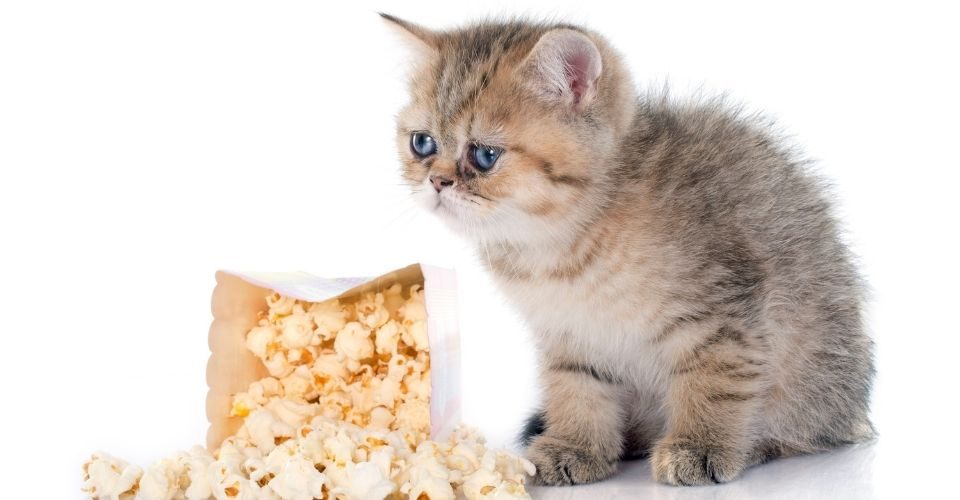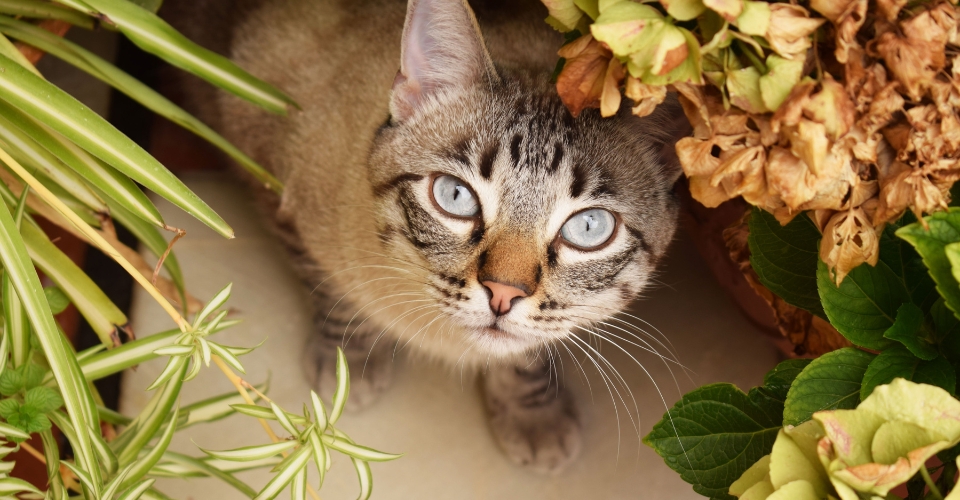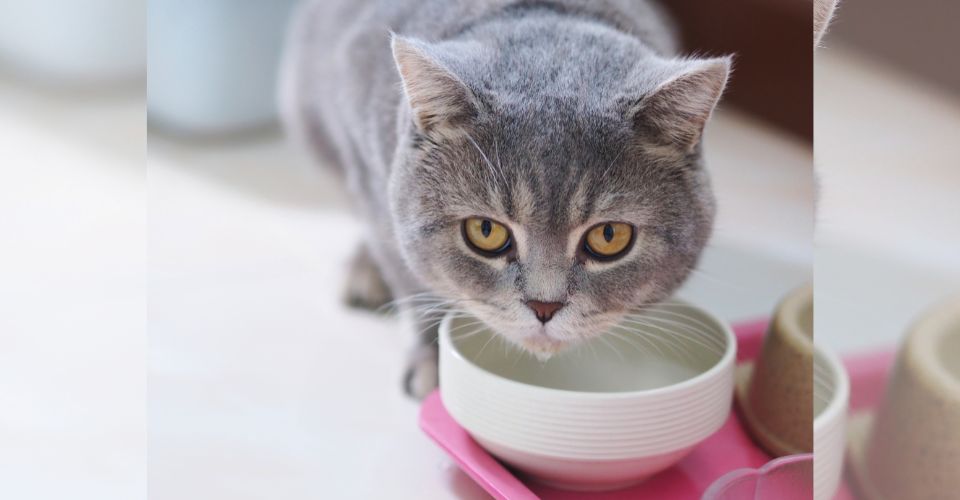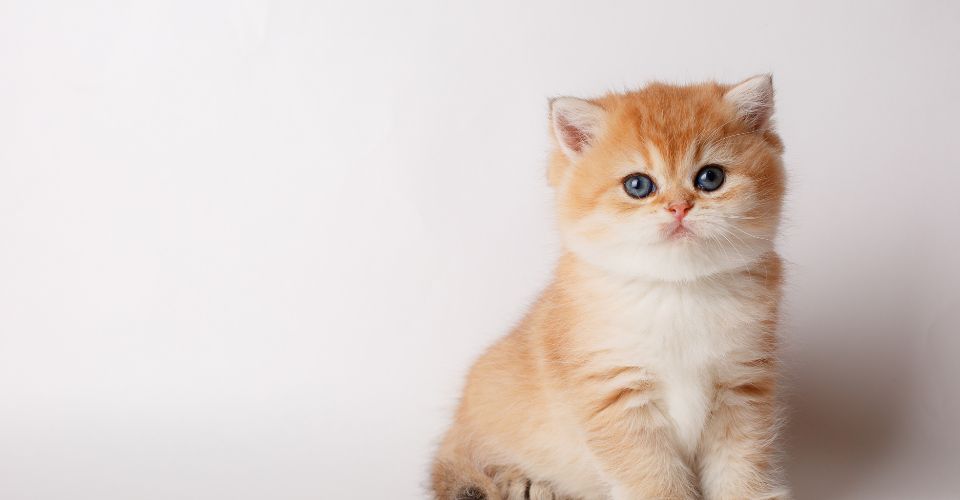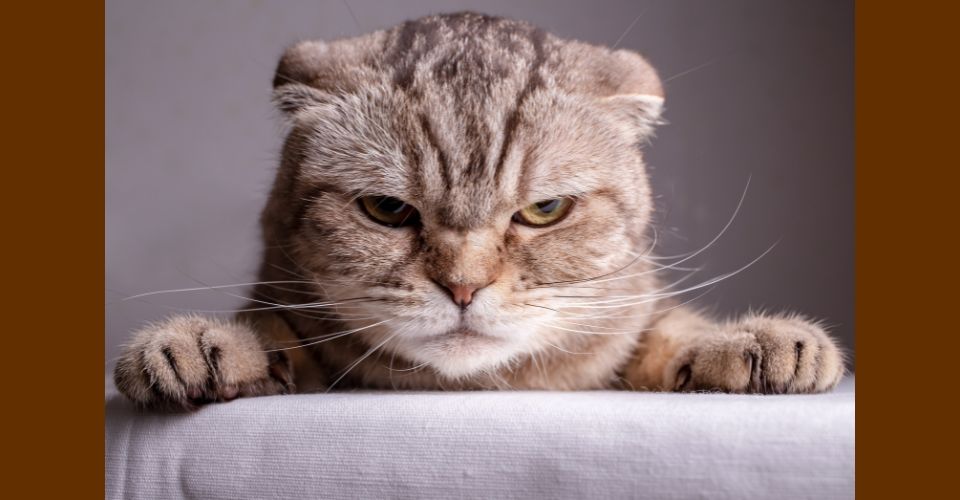It’s movie night, drapes are down, lights are shut out, popcorns are popped, you are all snuggled up on the comfy couch, and your favorite movie is playing on the screen. After a few minutes, your feline friend decides to join you on the couch. During your favorite scene, while you are fully immersed in the scene, you pick a handful of popcorns and accidentally drop some on the floor—your cat jumps to eat them. Watching your cat jumping for the popcorn, not only your is attention diverted from the scene, but you may also start to think: Can cats eat popcorn? Is it safe for them?
Popcorn is a popular and nutritious snack for humans but is it one of the cat-safe human foods or not? Before we get into the details, you should know that the answer is not so straightforward—there is more to it than just a simple yes or no.
So, Can Cats Eat Popcorn?
Yes, cats can have popcorns, but there is a catch.
There is nothing in freshly popped popcorns that is toxic to felines. If you have nothing but plain popcorns in your bowl, you can let your cat have it. But you will still have to make sure that she does not eat more than a couple of popped kernels.
You should never forget that cats not only have different nutritional needs from humans but also process human foods differently. This is the reason that many human foods are harmful to cats. That said, many human foods are not only safe but also beneficial for cats. However, as with other human foods, there are a few things you need to know before letting your cat munch on some freshly popped kernels.
Watch Out For Additives
Undoubtedly, plain popcorns are safe for cats to eat. But, these days, no one eats plain popcorns—there are toppings like butter, salt, caramel, and a variety of spices and seasoning like chili powder, cinnamon powder, black pepper, and garlic powder, etc. Many of these additives are toxic to cats. For instance, butter is loaded with fats which can lead to vomiting and diarrhea in cats. Similarly, garlic toxicity in cats can lead to hemolytic anemia. This is why you should never share popcorns with your cats if they are not plain.
Can Kittens Eat Popcorn?
Knowing that adult cats can safely eat freshly popped plain popcorns, one might think that popcorns are safe for kittens as well. But unfortunately, this is not the case. Vets advise that baby kittens are kept away from popcorns. Not only do the popcorns pose a substantial choking risk to the baby kittens, but they are also not good for their health.
Popcorns are not actually toxic, but they do not offer many nutritional benefits for the kittens. And as you know, in the early months, cats go through a whirlwind of developmental changes. For that, they need their nutritional requirements to be fully met. These requirements can only be met by conventional kitten food. So, it is advised that you feed nothing else than the kitten food to your young kitten.
Can Senior Cats Have Popcorns?
Just like popcorns are not safe for young kittens, they are not safe for senior cats either. In addition to posing a choking hazard, eating popcorns may also cause digestive problems for your cats. Moreover, just like baby kittens, senior cats also have special nutritional needs to stay in good health. As popcorns only take up space in the stomach and do not offer any nutritional benefits, it is advised that it should be kept away from senior cats, too.
Can Cats Eat Corn?
Just like popcorn, cats can have corn, too. In fact, corn is present in most cat foods that you buy from the market. You can confirm the same by looking at the ingredients of the cat food you put in your cat’s bowl. However, you should not feed whole grains of corn to your cat as they can be challenging for the fluff ball to chew on, and if ingested without proper chewing, it may cause an obstruction in the digestive tract.
According to WebMD, many cats enjoy eating whole grains like corn. However, you should keep in mind that corn does not provide much nutritional benefit to your cat. It is being used as a filler in the cat food and to create cohesion for the kibbles. It provides only traces of supplemental carbohydrates to cats.
Should You Give Your Cat Popcorns?
It is settled that popcorns are not inherently bad for cats, and they can safely consume popcorns. Thus, if your cat comes running to you as you get popcorns out of the oven, you do not have to guiltily refuse her. You can let her have some fun with a few popped kernels.
However, make sure that you have not added any additives like salt, butter, cheese, etc., to the popcorns. If you cannot eat popcorns without flavoring, you should separate some plain popcorns for your cat, before adding any additives. Even in the case of plain popcorns, you should not let her eat more than a couple of kernels, as it is only going to fill up her stomach without giving any nutritional benefit.
While your cat is eating or playing with popcorns, you should keep an eye on her as popcorns pose a choking hazard, especially unpopped kernels in the popcorn bowl. If your cat shows any sign of troubled breathing, you should immediately intervene.
What To Do if Your Cat Is Choking?
Instead of panicking, you should calm yourself and call your vet. You should immediately get your cat to the vet, and on the way, give her the following first aid.
To begin with, you should take hold of your cat as a choking cat would panic. Secondly, you should open her mouth, pull the tongue forward and see if there is any foreign object. If you see anything, you should carefully remove it with a tweezer or with your finger.
If it does not relieve your cat, you should try the Heimlich maneuver, discussed below.
Lay the cat on her side. Put one hand along her back and the other on her belly, just below the ribs, and give her several pushes—in and up. Check if the cat has thrown out any foreign body. If not, you should repeat the process until you are sure that the cat has expelled the foreign object that had obstructed the air passage and is now breathing normally. Even if the abdominal thrust has worked and she is breathing normally, you should still get her to the vet for the checkup as abdominal thrust may have caused her some damage—not necessarily, but still, it is a cat and cannot express if she is okay.
Find out what other foods cats can eat or not eat:

